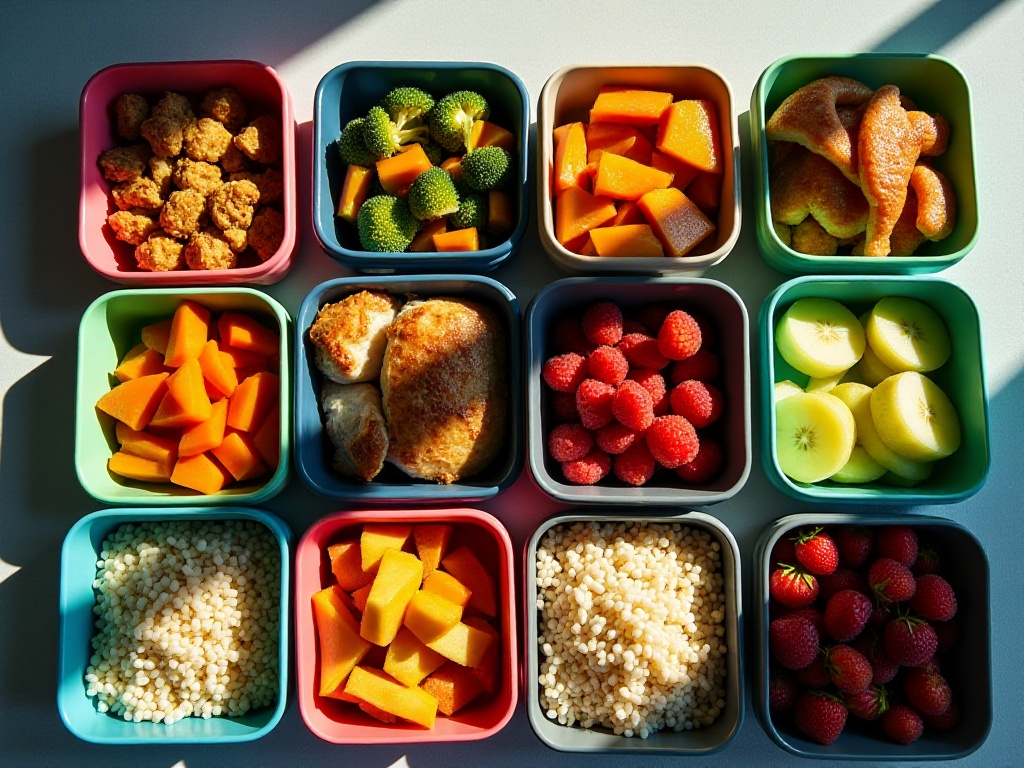
Opening Thoughts
Recently, my friends have all started obsessively tracking their workouts and counting calories, and my social media feed is flooded with "healthy recipes." Yet despite reading lots of materials, everyone still seems confused about how to eat properly. Some people think eating meat causes weight gain so they drastically restrict food, while others think carbs are the culprit so they completely avoid staple foods - these are all incorrect approaches. Today, let me explain what it really means to "eat well."
The Nutrition Pyramid
When it comes to nutrition, many people know they should eat a "balanced" diet, but can't explain what that actually means. In fact, nutritional balance isn't such a profound concept - let me break it down for you.
Let's first talk about carbohydrates. Carbs are our daily staple foods like rice, bread, and noodles. However, not all carbs are equally nutritious. Refined carbs like white rice and white bread may taste good but have relatively low nutritional value. I recommend choosing whole grain bread, brown rice, and oats, which are rich in dietary fiber that helps you feel full longer and promotes gut health.
I personally started replacing white rice with brown rice last year. To be honest, I didn't like it at first - the texture felt rough and it required more chewing. But after sticking with it for a month, I completely adjusted. Now I actually find white rice too soft and lacking texture. Plus, brown rice really does keep me feeling full longer - I don't get hungry after two hours like I used to with white rice.
Protein is another important nutrient. Many people know protein is important but don't know how much to eat. According to research, protein should make up 10-35% of our daily caloric intake. This might sound abstract, so here's an example: if you need 2000 calories per day (the standard intake for an average adult woman), your protein intake should be between 50-175 grams.
So how do we get protein? Chicken breast, fish, eggs, and soy products are all great protein sources. For example, 100 grams of chicken breast contains about 31 grams of protein. I always have chicken breast for lunch and tofu or eggs for dinner. Many people think chicken breast is dry and unpalatable, but with proper marination and healthy sauces, it can be quite delicious.

Nutritional Details
Speaking of protein sources, we must highlight fish. Fish not only contains quality protein but is also rich in omega-3 fatty acids. Fish like salmon, tuna, and sardines that are rich in omega-3 should be eaten at least twice a week. Omega-3 fatty acids are especially important for cardiovascular and brain health, can improve skin condition, and even have positive effects on mood.
I particularly enjoy eating salmon. I buy fresh salmon every week to pan-fry, and sometimes make sashimi. Many people think salmon is too expensive, but frozen salmon is much more affordable and maintains basically the same nutritional value. Cooking is simple too - just a quick pan-fry and some lemon juice makes it delicious.
Everyone knows fruits and vegetables are important, but many people still don't eat enough. You should eat at least 5 servings of different fruits and vegetables daily to ensure adequate vitamin and mineral intake. Many people might find "one serving" confusing. It's actually simple: a medium-sized apple is one serving, an orange is one serving, a handful of broccoli is one serving, and a medium-sized tomato is one serving.
Moreover, fruits and vegetables should be eaten in a variety of colors. Different colored produce contains different nutrients: red tomatoes and watermelon are rich in lycopene; orange carrots and pumpkins contain plenty of carotene; green spinach and broccoli are rich in folic acid and iron; purple eggplants and blueberries contain lots of antioxidants. So we should try to make our plates as colorful as possible.

Nutritional Supplements
When it comes to supplements, many people immediately think of vitamins and minerals. But if our daily diet is sufficiently balanced, most vitamins and minerals can be obtained from food. However, there are several nutrients that do need special attention.
First is calcium. Many people know calcium supplementation is important, but did you know vitamin D is equally important? Without vitamin D, calcium is difficult for the body to absorb. Besides sunlight, dairy products and dark green vegetables are good supplementary sources. I drink a glass of milk every morning and include some dark green vegetables like spinach, broccoli, and romaine lettuce with lunch and dinner.
Many people may not know that iron supplementation is also important, especially for women. Iron deficiency can lead to anemia, manifesting as fatigue, dizziness, and pale complexion. Red meat, organ meats, and shellfish are good sources of iron. Vegetarians can eat more spinach and legumes for plant-based iron sources, and pairing with vitamin C can improve iron absorption.
Probiotics shouldn't be overlooked either. Many people think eating some yogurt is enough for probiotics, but that's not the case. Probiotic sources are diverse - besides yogurt, kefir, kimchi, and natto are all fermented foods rich in probiotics. Foods like bananas, onions, garlic, and chives contain prebiotics, which are "food" for probiotics and help them grow and multiply in the gut.

Eating Habits
After covering specific nutrients, let's talk about eating habits. Good eating habits are as important to health as nutrition itself.
First is controlling salt intake. The World Health Organization recommends adults should not consume more than 6 grams of salt daily. This sounds simple but is actually quite difficult. Many processed foods we eat contain large amounts of salt, like instant noodles, potato chips, and sauces. My suggestion is: use less salt when cooking at home and season with spices instead. Natural seasonings like herbs, ginger, garlic, Sichuan pepper, and star anise not only add flavor but also have various health benefits.
Next is sugar control. Many people think they don't consume too much sugar if they don't eat candy and desserts, but that's not true. The beverages, yogurt, juice, bread, and sauces we consume daily may contain added sugars. I suggest paying attention to ingredient labels - if sucrose, glucose, or fructose appear among the first few ingredients, it indicates the food has a high sugar content.
Let's talk about meal timing. Many people skip meals due to busy work schedules, which is actually very bad for health. I recommend trying to eat at fixed times, especially breakfast. Breakfast is particularly important for daily energy supply - if you don't eat well in the morning, you're likely to overeat at lunch. My habit is to eat breakfast at 7 AM, lunch at noon, and dinner at 6 PM.
Drinking water is also a big issue. Many people only think to drink water when they're thirsty, but that's too late. When we feel thirsty, our body is already in a mild state of dehydration. My habit is to keep a water bottle on my desk and drink a cup every hour. It's best to drink plain water rather than sugary beverages. If you find plain water too bland, you can add lemon slices or mint leaves.

Practical Advice
To truly achieve nutritional balance, preparation is important. I suggest spending an hour each week on meal prep. For example, on weekends, I prepare all my lunches for the week and freeze them in portions. This not only saves time but also prevents random eating when hungry.
Let me share my meal prep experience. First is the shopping list - I prepare a list of ingredients needed for the week, including:
Staples: brown rice, whole wheat bread, oatmeal Protein: chicken breast, salmon, eggs, tofu Vegetables: broccoli, carrots, tomatoes, spinach Fruits: apples, bananas, oranges Others: nuts, yogurt, olive oil
After making the list, I can do all the shopping at once. When shopping, pay attention to ingredient freshness, especially for meat and seafood. After bringing everything home, I wash and cut all vegetables and store them in containers. I also marinate meat in advance and freeze it in meal-sized portions.
Every morning, I take out the ingredients I need for the day. This way, whether I'm eating at home for lunch or bringing food to work, I just need to heat it up. Plus, since I prepare everything myself, I can strictly control seasonings and oil/salt, making it both healthy and worry-free.
Besides regular meals, snack choices are also important. There are always various snack temptations in the office - if you don't prepare healthy snacks in advance, it's easy to end up eating high-calorie chips and cookies. My go-to healthy snacks include:
Nuts: a small handful daily for healthy fats and protein Fruits: satisfy cravings anytime while getting vitamins Yogurt: eat when hungry for satiety plus protein and calcium Whole wheat crackers: when craving something salty

Final Thoughts
After saying all this, the most important thing is to start taking action now. You don't need to change all your eating habits at once - you can start with one small goal. For example, today you could switch from white bread to whole wheat bread for breakfast, or prepare some healthy snacks for the office. Take it slowly, and things will gradually improve.
Remember, healthy eating isn't a short-term diet plan but a lifestyle that requires persistence. Don't put too much pressure on yourself - it's okay to indulge occasionally, as long as you're heading in the right direction overall.
I hope this article helps everyone better understand nutrition and begin their journey of scientific eating. If you have any insights about nutrition and health, feel free to share and discuss in the comments. Let's encourage each other and progress together on the path to health!
Next
Smart People's Nutrition Management Tips for Effortless Health and Fitness
A comprehensive guide to healthy eating and nutrition, covering balanced diet composition, healthy eating habits, and practical tips. Detailed information on choosing carbohydrates, proteins, healthy fats, and strategies for diverse fruit and vegetable intake
Done Being a Nutrition Novice? This Comprehensive Nutrition Guide Will Help You Eat Scientifically Starting Today
A comprehensive guide exploring core principles of balanced nutrition and healthy eating, including nutritional optimization advice, scientific dietary methods, and practical meal management tips to help readers establish healthy eating habits
A Nutritionist Tells You: This is How to Eat Healthy Without Too Much Hassle - I've Been Practicing for 3 Years
A comprehensive guide to healthy eating and nutrition improvement, covering dietary principles, habit formation, and practical tips on whole grain selection, fruit and vegetable combinations, and protein intake for a balanced diet
Next

Smart People's Nutrition Management Tips for Effortless Health and Fitness
A comprehensive guide to healthy eating and nutrition, covering balanced diet composition, healthy eating habits, and practical tips. Detailed information on choosing carbohydrates, proteins, healthy fats, and strategies for diverse fruit and vegetable intake

Done Being a Nutrition Novice? This Comprehensive Nutrition Guide Will Help You Eat Scientifically Starting Today
A comprehensive guide exploring core principles of balanced nutrition and healthy eating, including nutritional optimization advice, scientific dietary methods, and practical meal management tips to help readers establish healthy eating habits

A Nutritionist Tells You: This is How to Eat Healthy Without Too Much Hassle - I've Been Practicing for 3 Years
A comprehensive guide to healthy eating and nutrition improvement, covering dietary principles, habit formation, and practical tips on whole grain selection, fruit and vegetable combinations, and protein intake for a balanced diet
